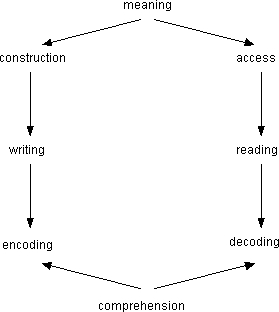
In the past, I (Paul Dowling) have used the term 'literacy' to refer to the authoring and audiencing (lets say, production and reception) of inscriptions.
Should the expression, 'lets say' include an apostrophe between the t and the s?
'The imaginitive work in writing focuses on filling words with meaning—and then reading the filled elements together, in the given syntactic structure. In image, imagination focuses on creating the order of the arrangement of elements which are already filled with meaning.' (Kress, 2003; 4)
[I just dont understand this at all!] (Dowling, from my notes)
- Autonomous Literacy: Philip Gough (1995)
- Texts have independent meanings
- Literacy is concerned with the construction of and accessing these meanings.

- encoding & decoding are psychological skills which are more or less independent of context
- Anthropological Approach
- Brian Street (1993) argues that any 'literacy event' is always contextualised. He and other anthropologists of language such as Shirley Brice Heath adopt an ethnographic approach to the study of literacy performances.
-
- Critical Literacy
- Authors such as Carmen Luke and Robert Ferguson argue that literacy should encompass critical facilities so that the operation of power in the definition and representation of knowledge etc should come under scrutiny, particularly in the context of developments in new technologies and media. Paulo Freire's advocated that literacy should be taught in the context of an emancipatory pedagogy of conscientising.
-
'"Every civilization needs to overestimate the objectivity of its thought," as Lévi-Strauss remarks, " and this tendency is never absent." The observation apparently refers to an exaggerated appreciation of of the practicality and necessity of one's categories, but then it can also be taken another way. People overestimate their objectivity because they are noticing only a fraction of the empirical characteristics of things, a selective attention and evaluation that corresponds to an act of categorization. Note that we are not dealing simply with physiological sensations but with empirical judgements. The biological mechanisms of perception are not in question, nor is their universality. At issue, rather, is the organization of experience, including the training of the senses, according to social canons of relevance. These canons, and therefore the distinctions people make among objects, vary even among "particular social groups in the [same] national society," as the Encyclopédie of the philosophes had already observed ... For, things are not only perceived, they are thereby known, which is to say, they are classified. Hence people who are perceiving the same same objects are not necessarily perceiving the same kinds of things—as happens ... in discriminations of "natural species." And conversely, people may agree about what certain images are, while perceiving them in entirely different ways—as happens to the red-green color blind.' (Sahlins, M. (1995) How 'Natives' Think: About Captain Cook, for example, Chicago: University of Chicago Press. p.155)
Part of an essay written by a Scottish 13-year-old secondary school pupil - and its translation
My smmr hols wr CWOT. B4, we used 2 go 2 NY 2C my bro, his GF & thr 3 :-@ kds FTF. ILNY, its gr8.
Bt my Ps wr so {:-/ BC o 9/11 tht thay dcdd 2 stay in SCO & spnd 2 wks up N.
Up N, WUCIWUG -- 0. I ws vvv brd in MON. 0 bt baas & .
My summer holidays were a complete waste of time. Before, we used to go to New York to see my brother, his girlfriend and their three screaming kids face to face. I love New York, it's a great place.
But my parents were so worried because of the terrorism attack on September 11 that they decided we would stay in Scotland and spend two weeks up north.
Up north, what you see is what you get - nothing.
I was extremely bored in the middle of nowhere. Nothing but sheep and mountains.
(Lucy Ward, social affairs correspondent, The Guardian, Thursday December 23, 2004)
Representation cf Presentation
- The English language headphone guide to the kabuki performance at the kabuki-za in Higashi Ginza, Tokyo on 7th January 2005 included a description of kabuki theatre as presentational compared with the representational form of Western theatre. The kabuki performance is not intended to represent reality so the audience does not view it by comparison with the real world, rather, every aspect of the kabuki performance, from the play itself to the props and sets to the on-stage stagehands are there to assist the actor in the presentation of his (and they are all male actors) skills.
- What do I need to know in order to make sense of a scene in which a man dressed as a woman runs offstage carrying a small statue of a god that had just been revealed as in fact a small child whilst four actors dressed as soldiers fall on their backs and do bicycle pedalling with their legs in the air?
- What do I need to know in order to make sense of the car chase scene in the film Bullit?